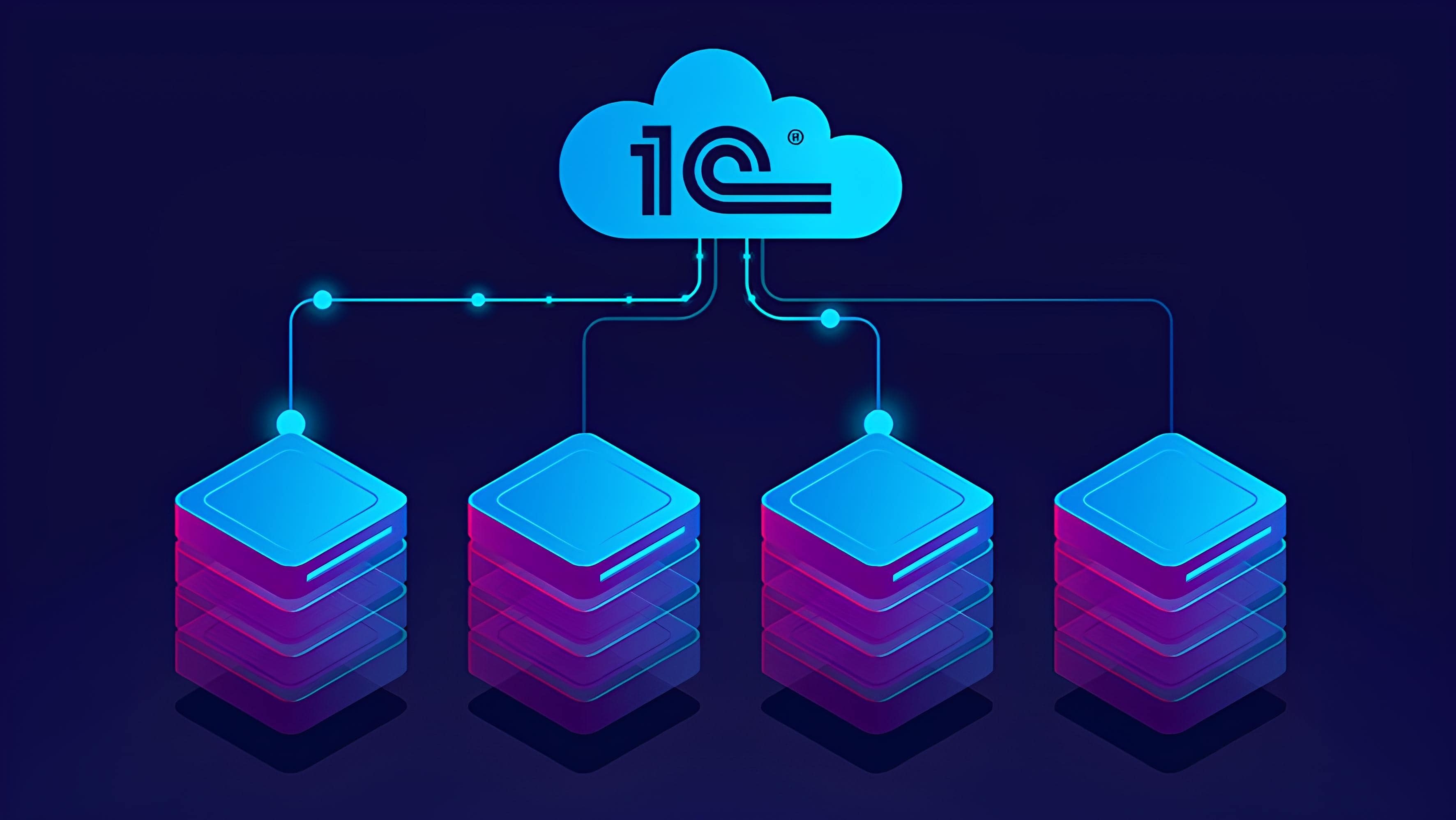Why do you need 1C hosting?

First, let's figure out what hosting is in general. Hosting or cloud server is a set of services that allows hosting and access to information via the Internet. Simply put, this is a system with which you can store any data on the Internet, while having constant unlimited access to it.
Any hosting has a number of characteristics on which the speed, as well as the quality of work with the data placed on it, depends.
What does hosting include?
- Physical server, processors, RAM, hard drives or as it is called “hardware”.
- “Software”, which ensures the interaction of various network protocols, scripts, operating systems. In other words, special server programs that allow the hardware to work correctly.
- Main and backup power supplies, as well as Internet access. Actually, this is what allows you to store your data remotely and have uninterrupted access to it.
- Protecting servers, ensuring the safety of information. That is, various settings that do not allow viruses and attackers to penetrate servers and gain access to information stored on them.
- Maintenance, timely replacement and updating of components. In other words, everything that allows the equipment to work correctly, as well as increasing its power.
Now let's move on to the types of hosting, their advantages and disadvantages. After all, this is what will allow you, as a potential user, to understand whether you need this service at all and make the final choice in favor of one option or another.
Virtual (Shared-hosting)
The most popular type of hosting. In essence, this is the provision of a server for the needs of a large number of clients. Server capacity and physical space on hard drives are divided among all users.
The high demand for such solutions is explained by their relatively low price, as well as ease of use. As a rule, a standard control panel is provided here. In it, a minimum number of settings are available to the client (downloading/uploading files, creating backup copies, etc.), and general server settings are carried out by the hosting provider.
The disadvantages of such solutions may be visible on large or individual projects. Relatively speaking, due to the fact that all users sit in one place, as the occupied space of one increases, everything else becomes cramped. In addition, you cannot set individual settings, for example, change the operating system, or install drivers for specific equipment.
Virtual dedicated server VDS.
VDS is similar to virtual, with the only difference being that with it, a remote shared server is divided into a separate virtual machine for each client. Simply put, a separate place is allocated for your project and your “neighbors” will not disturb you.
This hosting option is suitable either for slightly larger projects, or for those who want individuality or independence.
Pros:
- Each virtual machine has a separate OS installed. If you want, install Linux, if you want Windows, no one limits you in this.
- Certain equipment capacities, the amount of RAM, as well as other types of resources necessary for full and stable operation. Simply put, if one of the “neighbors” grows up in the space you occupy, this will not affect you in any way.
- Administrative access to settings and management of a dedicated virtual machine. Perhaps this is a plus and a minus at the same time. If you have a qualified employee on staff who can manage all this, great. If you don’t have this, you’ll have to look externally or order the service from a provider.
The disadvantages include:
- Higher cost compared to the first option.
- As mentioned above, you need a qualified specialist.
Dedicated server
To put it very simply, this is a server completely assembled just for you. It is usually used for large-scale projects, when there is no point in buying expensive equipment, and it is easier to rent it.
Advantages: a separate server under your full control. Disadvantages: high cost, difficult to manage. This will require an experienced full-time system administrator, programmer and other server-servicing specialists.
Now about 1C hosting.
1C hosting is the same hosting that we described earlier, only for a specific project. Namely, for the placement of 1C databases. Accordingly, the varieties, pros and cons here are exactly the same as those of a regular cloud server.
One has only to say that not all hosting providers in Russia, and even less so abroad, have competencies in 1C. Accordingly, all questions regarding its performance, settings and other issues with such providers lie on the clients’ side. In this case, the hosting provider provides “space” for hosting databases, ensures the functionality and security of data storage.
This option may be convenient for those who already have the necessary specialists on staff, but want to save on the purchase and maintenance of expensive server equipment. For all other clients who require the competencies of 1C programmers and/or 1C consultants, we recommend choosing a hosting provider with competencies in 1C.
We, in turn, also offer 1C hosting service, the advantages of which, among others:
- Our servers are located in a Tier-3 data center in the Russian Federation. Your databases will not be subject to sanctions, and access to them is reliably protected.
- We have qualified specialists on our staff who constantly monitor the load on the servers, and also carry out their regular maintenance and updating.
- We regularly make backup copies of your databases so that you can access them if necessary.
- We provide clients with flexible tariffs and the ability to choose settings. From the volume of hardware to the choice of operating system and the need to rent 1C licenses.
- And, of course, the presence of 1C competencies (consultants and programmers). We not only help you move your databases to our servers, but we will also help you with your further work with 1C. At your request, we can solve any problems with 1C databases.
What problems does 1C hosting solve?
The service is suitable for those who have already purchased a license, but do not want to incur the costs of purchasing their equipment, as well as its regular updating and support. At the same time, hosting can get all the benefits of reliable cloud storage and save your budget.
- Quick start: work in the cloud on the same day of application
- Stable work: preparation of all reports without stops and brakes
- Stable work: preparation of all reports without stops and brakes
- Saving on technical specialists: we will take care of the issues of migration, deployment and support of 1C solutions
- Fault tolerance and security of 1C databases: certified Tier III data centers with a whole range of information security measures (protection against audits and theft)
- Saving money on the purchase of hardware and software: significant savings due to the fact that you do not need to purchase equipment and keep your own technical specialists on staff
- High-quality technical support 24/7: service is provided by certified specialists around the clock
- Guaranteed server availability: fault-tolerant hosting infrastructure with availability backed by financial guarantees
- Rapid scaling of 1C infrastructure: you can quickly expand disk space and increase the necessary capacity





